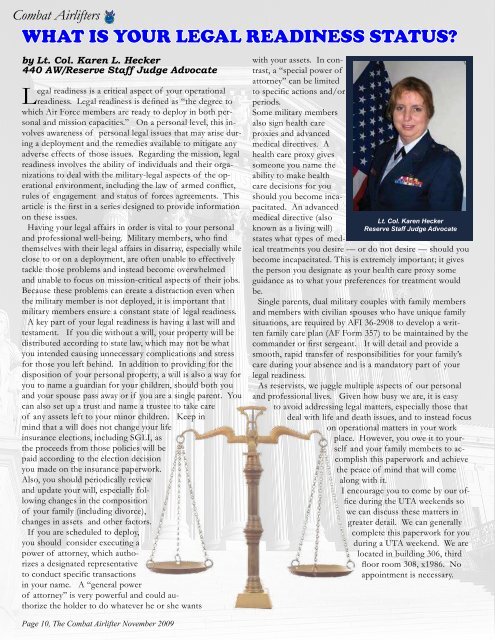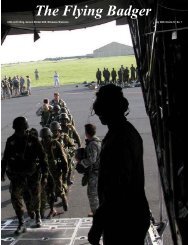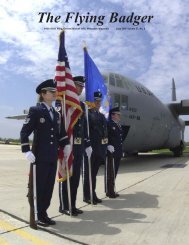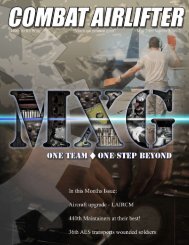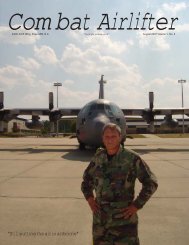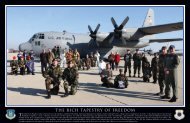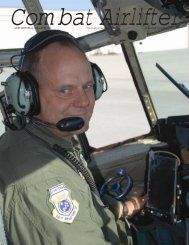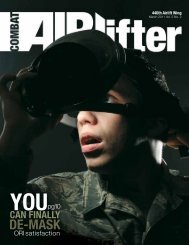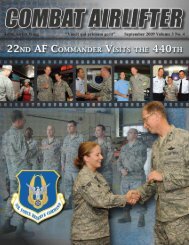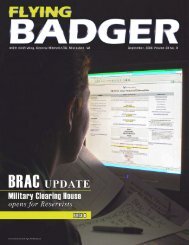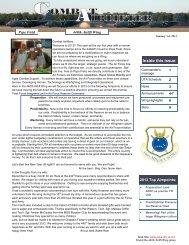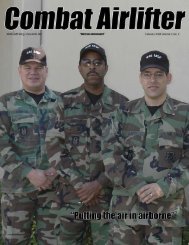COMBAT AIRLIFTER - 440th Airlift Wing
COMBAT AIRLIFTER - 440th Airlift Wing
COMBAT AIRLIFTER - 440th Airlift Wing
- No tags were found...
You also want an ePaper? Increase the reach of your titles
YUMPU automatically turns print PDFs into web optimized ePapers that Google loves.
Combat <strong>Airlift</strong>ersWHAT IS YOUR LEGAL READINESS STATUS?by Lt. Col. Karen L. Hecker440 AW/Reserve Staff Judge AdvocateLegal readiness is a critical aspect of your operationalreadiness. Legal readiness is defined as “the degree towhich Air Force members are ready to deploy in both personaland mission capacities.” On a personal level, this involvesawareness of personal legal issues that may arise duringa deployment and the remedies available to mitigate anyadverse effects of those issues. Regarding the mission, legalreadiness involves the ability of individuals and their organizationsto deal with the military-legal aspects of the operationalenvironment, including the law of armed conflict,rules of engagement and status of forces agreements. Thisarticle is the first in a series designed to provide informationon these issues.Having your legal affairs in order is vital to your personaland professional well-being. Military members, who findthemselves with their legal affairs in disarray, especially whileclose to or on a deployment, are often unable to effectivelytackle those problems and instead become overwhelmedand unable to focus on mission-critical aspects of their jobs.Because these problems can create a distraction even whenthe military member is not deployed, it is important thatmilitary members ensure a constant state of legal readiness.A key part of your legal readiness is having a last will andtestament. If you die without a will, your property will bedistributed according to state law, which may not be whatyou intended causing unnecessary complications and stressfor those you left behind. In addition to providing for thedisposition of your personal property, a will is also a way foryou to name a guardian for your children, should both youand your spouse pass away or if you are a single parent. Youcan also set up a trust and name a trustee to take careof any assets left to your minor children. Keep inmind that a will does not change your lifeinsurance elections, including SGLI, asthe proceeds from those policies will bepaid according to the election decisionyou made on the insurance paperwork.Also, you should periodically reviewand update your will, especially followingchanges in the compositionof your family (including divorce),changes in assets and other factors.If you are scheduled to deploy,you should consider executing apower of attorney, which authorizesa designated representativeto conduct specific transactionsin your name. A “general powerof attorney” is very powerful and could authorizethe holder to do whatever he or she wantsLt. Col. Karen HeckerReserve Staff Judge Advocatewith your assets. In contrast,a “special power ofattorney” can be limitedto specific actions and/orperiods.Some military membersalso sign health careproxies and advancedmedical directives. Ahealth care proxy givessomeone you name theability to make healthcare decisions for youshould you become incapacitated.An advancedmedical directive (alsoknown as a living will)states what types of medicaltreatments you desire — or do not desire — should youbecome incapacitated. This is extremely important; it givesthe person you designate as your health care proxy someguidance as to what your preferences for treatment wouldbe.Single parents, dual military couples with family membersand members with civilian spouses who have unique familysituations, are required by AFI 36-2908 to develop a writtenfamily care plan (AF Form 357) to be maintained by thecommander or first sergeant. It will detail and provide asmooth, rapid transfer of responsibilities for your family’scare during your absence and is a mandatory part of yourlegal readiness.As reservists, we juggle multiple aspects of our personaland professional lives. Given how busy we are, it is easyto avoid addressing legal matters, especially those thatdeal with life and death issues, and to instead focuson operational matters in your workplace. However, you owe it to yourselfand your family members to accomplishthis paperwork and achievethe peace of mind that will comealong with it.I encourage you to come by our officeduring the UTA weekends sowe can discuss these matters ingreater detail. We can generallycomplete this paperwork for youduring a UTA weekend. We arelocated in building 306, thirdfloor room 308, x1986. Noappointment is necessary.Dot your ‘I’s and cross your ‘T’s it’s ORE timeby Master Sgt. Steven StaedlerWhen it comes to processing through a mobility line,Master Sgt. Michael Lock has been there, done that.The air transportation manager for the 53 rd Aerial PortSquadron has deployed 18 times in the past eight years: 13to the Area of Responsibility (AOR) and five to statesidelocations. Still, Sergeant Lock sat in the bleachers holdinghis mobility folder with other Airmen from the squadron,waiting to be called upon to walk through the mobility line.“For me this is old hat, but it’s good for the younger guyscoming up in the squadron go to through the line and seewhat it’s like,” Sergeant Lock said. “It’s good for them to getthe experience and to make sure they’re taking care of.”Sergeant Lock was one of about 100 Airmen processingthrough the mock mobility line at Pope Air Force Base, N.C.on Saturday of the October UTA. The mobility processingline exercise, which ensures Airmen are eligible to deployby having all their affairs in order, is one of the first eventsundertaken by the base as it prepares to gear up for itsOperational Readiness Exercise in January 2011.Although the ORI date seems like a long time away, Airmenonly have about 50 UTA and annual tour days to prepare forthe exercise. That’s why much of the upcoming UTAs andannual tours will be devoted toward practicing events andCombat <strong>Airlift</strong>ersactivities for the ORI.Capt. Shary Acevedo, <strong>440th</strong> Mission Support Group, saidthe processing line serves as a good opportunity, not only forAirmen going through the line, but those who are workingthe line as a way to evaluate their processes and procedures.“Our No. 1 priority is to make it a smooth transition fromPhotographs by U.S. Air Force Senior Airman Jacqueline PenderAirmen from the <strong>440th</strong> <strong>Airlift</strong> <strong>Wing</strong> participate in a mobility deployment line exercise. Left image: Airman Sarak Mayernik (right) and Staff Sgt. CynthiaFlaherty check ID cards and dog tags. (center) Capt. Shary Acevedo, acting MPF commander, and Lt. Col. Anne Low discuss PRF requirements. (left)Master Michael Lock completes the inprocessing paperwork before processing through the individual processing line stations.the time Airmen walk in the door until the moment they exitthe facility,” she said. “Our goal is to receive and “excellent”rating in the ORI and we plan to do that by supporting thedeploying Airmen and making the transition an easy one forthem.”Checking ID cards and dog tags is the first stop for Airmenon the processing line. There, Staff Sgt Cynthia Flaherty andAirman Sarah Mayernik, <strong>440th</strong> Mission Personnel Flight,check records and mobility folders to ensure everyone iseligible to deploy.While the exercise is “old hat” to Sergeant Lock, it’s allvery new to Airman Mayernik, who just graduated from basictraining this summer before joining the unit in August.“I’m really just taking it all in and learning as much as Ican,” Airman Mayernik said. “I want to do everything I canto help people as they process through.”Airmen from Pope AFB are expected to participate inthe ORI with Reservists from the 916th ARW at Seymour-Johnson Air Force Base, N.C.Page 10, The Combat <strong>Airlift</strong>er November 2009 <strong>440th</strong> <strong>Airlift</strong> <strong>Wing</strong>, Pope AFB, Page 11


